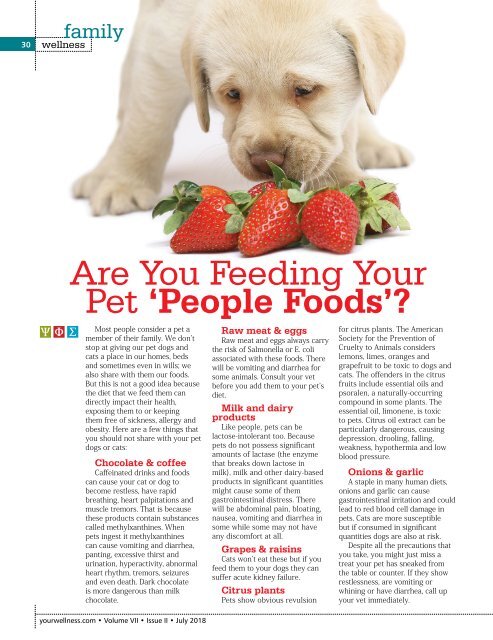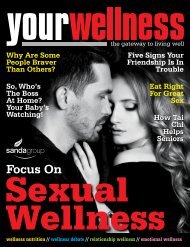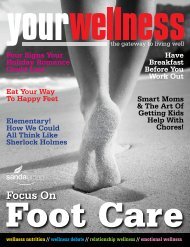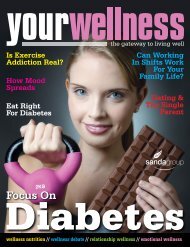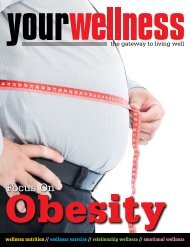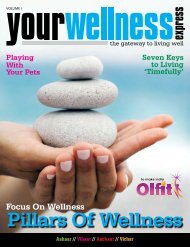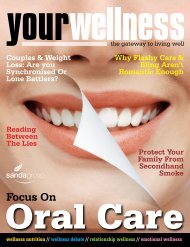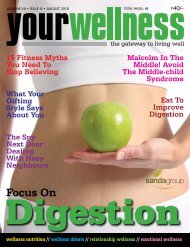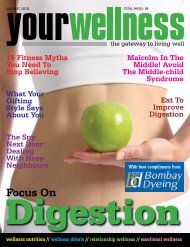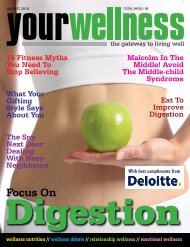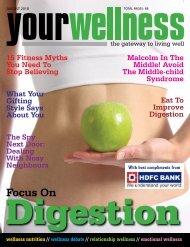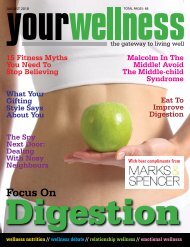New India_Assurance_ISSUE_July-2018
Create successful ePaper yourself
Turn your PDF publications into a flip-book with our unique Google optimized e-Paper software.
family<br />
30 wellness<br />
Are You Feeding Your<br />
Pet ‘People Foods’?<br />
Most people consider a pet a<br />
member of their family. We don’t<br />
stop at giving our pet dogs and<br />
cats a place in our homes, beds<br />
and sometimes even in wills; we<br />
also share with them our foods.<br />
But this is not a good idea because<br />
the diet that we feed them can<br />
directly impact their health,<br />
exposing them to or keeping<br />
them free of sickness, allergy and<br />
obesity. Here are a few things that<br />
you should not share with your pet<br />
dogs or cats:<br />
Chocolate & coffee<br />
Caffeinated drinks and foods<br />
can cause your cat or dog to<br />
become restless, have rapid<br />
breathing, heart palpitations and<br />
muscle tremors. That is because<br />
these products contain substances<br />
called methylxanthines. When<br />
pets ingest it methylxanthines<br />
can cause vomiting and diarrhea,<br />
panting, excessive thirst and<br />
urination, hyperactivity, abnormal<br />
heart rhythm, tremors, seizures<br />
and even death. Dark chocolate<br />
is more dangerous than milk<br />
chocolate.<br />
Raw meat & eggs<br />
Raw meat and eggs always carry<br />
the risk of Salmonella or E. coli<br />
associated with these foods. There<br />
will be vomiting and diarrhea for<br />
some animals. Consult your vet<br />
before you add them to your pet’s<br />
diet.<br />
Milk and dairy<br />
products<br />
Like people, pets can be<br />
lactose-intolerant too. Because<br />
pets do not possess significant<br />
amounts of lactase (the enzyme<br />
that breaks down lactose in<br />
milk), milk and other dairy-based<br />
products in significant quantities<br />
might cause some of them<br />
gastrointestinal distress. There<br />
will be abdominal pain, bloating,<br />
nausea, vomiting and diarrhea in<br />
some while some may not have<br />
any discomfort at all.<br />
Grapes & raisins<br />
Cats won’t eat these but if you<br />
feed them to your dogs they can<br />
suffer acute kidney failure.<br />
Citrus plants<br />
Pets show obvious revulsion<br />
for citrus plants. The American<br />
Society for the Prevention of<br />
Cruelty to Animals considers<br />
lemons, limes, oranges and<br />
grapefruit to be toxic to dogs and<br />
cats. The offenders in the citrus<br />
fruits include essential oils and<br />
psoralen, a naturally-occurring<br />
compound in some plants. The<br />
essential oil, limonene, is toxic<br />
to pets. Citrus oil extract can be<br />
particularly dangerous, causing<br />
depression, drooling, falling,<br />
weakness, hypothermia and low<br />
blood pressure.<br />
Onions & garlic<br />
A staple in many human diets,<br />
onions and garlic can cause<br />
gastrointestinal irritation and could<br />
lead to red blood cell damage in<br />
pets. Cats are more susceptible<br />
but if consumed in significant<br />
quantities dogs are also at risk.<br />
Despite all the precautions that<br />
you take, you might just miss a<br />
treat your pet has sneaked from<br />
the table or counter. If they show<br />
restlessness, are vomiting or<br />
whining or have diarrhea, call up<br />
your vet immediately.<br />
yourwellness.com • Volume VII • Issue II • <strong>July</strong> <strong>2018</strong>


